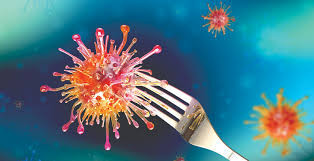
Foodborne illnesses are a significant public health concern worldwide, with parasitic infections being a major contributor to this burden.
Meat consumption is a common practice in many cultures, with beef and pork being popular choices.
These meats provide essential protein for the body, making them a staple in many diets.
However, eating undercooked or half-cooked beef and pork poses significant health risks.
The risks of undercooked meat
Trichinosis, a parasitic infection caused by Trichinella spiralis, is one of the most significant risks associated with eating undercooked pork. In addition, toxoplasmosis, which is caused by Toxoplasma gondii, leads to serious health issues in individuals with weakened immune systems, such as those with HIV and Aids.
In the same vein, beef also poses risks, particularly from parasites such as Taenia saginata (beef tapeworm), which causes intestinal infections and leads to symptoms such as abdominal pain, weight loss, and digestive problems.
Undercooked beef further poses risks, including infections caused by Sarcocystis hominis, which leads to gastrointestinal symptoms and other health problems.
- Toxic smoke chokes Karoi residents
- Co-operate to curb malaria, Mash West farmers urged
- Experts bemoan shortage of mental healthcare professionals
- Zim pilots new HIV drug
Keep Reading
According to the World Health Organisation (WHO) foodborne parasitic infections are a significant public health concern worldwide with an estimated of 11,7 million people suffered from foodborne parasitic infections, with many cases attributed to the consumption of undercooked meat.
Other health concerns associated with beef and pork consumption
Apart from parasitic infections, there are several other diseases and health concerns associated with consuming beef and pork that individuals should be aware of. One of the most significant concerns is foodborne bacterial infections.
Beef and pork are often contaminated with bacteria such as Salmonella, Campylobacter, and Escherichia coli (E. coli), which cause food poisoning and lead to symptoms such as diarrhoea, abdominal cramps, and vomiting.
The development of antibiotic-resistant bacteria is another concern. Overuse of antibiotics in livestock production has contributed to the emergence of antibiotic-resistant bacteria, making infections more challenging to treat.
This highlights the importance of responsible antibiotic use in agriculture and the need for alternative approaches to promoting animal health.
Foodborne viral infections are also a risk associated with consuming beef and pork.
Viruses such as norovirus and rotavirus are transmitted through contaminated meat, particularly if handling and cooking practices are inadequate.
Proper handling and cooking techniques are essential to minimise the risk of viral infections.
Prion diseases are another concern associated with beef consumption. Prions are infectious proteins that cause diseases such as Bovine Spongiform Encephalopathy (BSE or mad cow disease) in cattle and transmissible spongiform encephalopathy in humans (EFSA, n.d.).
While the risk of prion disease transmission through beef is relatively low, individuals should still be aware of this concern.
Beef and pork are often contaminated with toxins and contaminants such as dioxins, polychlorinated biphenyls (PCBs), and heavy metals like lead and mercury.
These contaminants have adverse health effects, emphasising the importance of choosing meat from reputable sources and following safe handling practices.
Prevention and control measures
Cooking beef and pork to the recommended internal temperature is essential to prevent parasitic infections. The United States Department of Agriculture (USDA) recommends cooking beef to an internal temperature of at least 145°F (63°C), while pork should be cooked to an internal temperature of at least 145°F (63°C) with a three-minute rest time (USDA, n.d.).
Proper food handling and storage practices play a critical role in preventing parasitic infections.
This includes handling raw meat, poultry, and seafood safely, separating them from ready-to-eat foods, and cooking food to the recommended internal temperature.
Meat from farms or markets that follow good agricultural practices reduces the risk of contamination.
Vulnerable populations, such as pregnant women, young children, and individuals with weakened immune systems, should avoid undercooked or raw meat. Therefore, prioritising food safety and taking steps to minimise the risk of contamination have a significant impact on public health and well-being.
Conclusion
In conclusion, eating fully cooked beef and pork is crucial for protecting one's health from parasites.
As such, prioritising health and taking steps to prevent parasitic infections enables individuals to enjoy the nutritional benefits of meat while minimising risks.
Continued awareness and education equip people to make informed choices about their diet and protect their health. It is also important for individuals to understand the risks associated with undercooked meat and take appropriate steps to prevent parasitic infections in order to immensely contribute to a healthier and more sustainable food system.
- Clever Marisa (PhD) is a social scientist and public health practitioner. The views expressed here are his own and do not necessarily reflect the views of his affiliated institution or any other organisation










